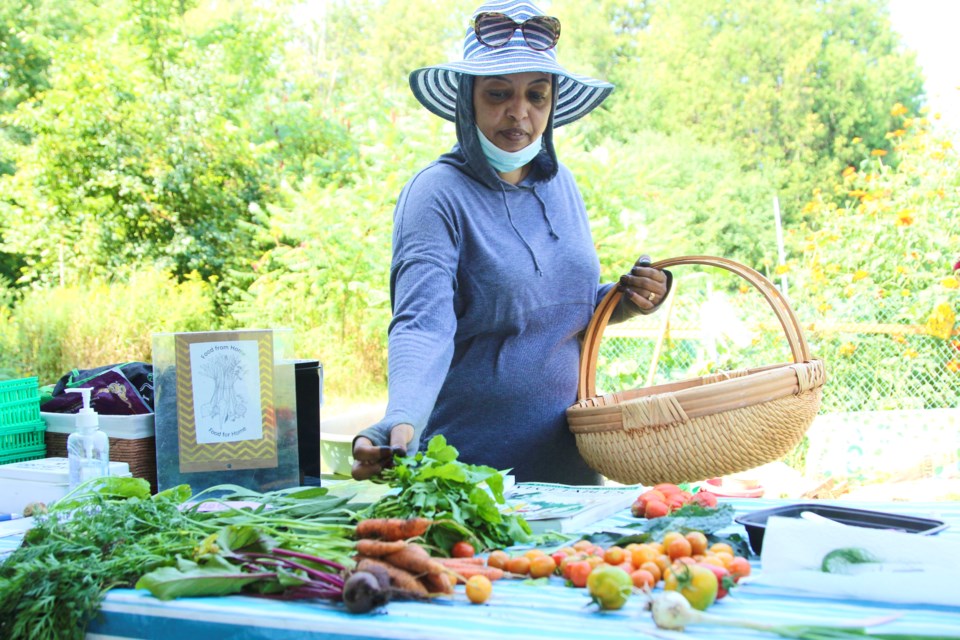Every few days, Rehab Badri comes to a little community garden beside St.Joseph’s Health Centre on Westmount Road to harvest some vegetables she grew herself.
But this isn’t just any community garden and she doesn’t harvest just any vegetables. Badri, a woman of Sudanese origin, finds the garden a therapeutic place, one that helps her connect to her local community, and also remember her homeland.
As a child in Sudan, she remembers eating arugula her mom harvested. Now she grows that same vegetable in a little space in Guelph.
“My mom loved it so much and I miss her,” says Badri.
“When I come here, everything that my mom loves, I try to make it and eat it,” she says, holding a fresh basket of harvested vegetables while getting teary eyed remembering her mother.
And that is the magic of an urban agriculture project called Food from Home = Food for Home funded by Our Food Future. It helps newcomers to Canada learn gardening skills in their new country and also gives them a way to connect to their country of origin through food they grow here.
From bitter melon to indigo rose tomatoes. This year, they created an encasement with swamp-like conditions to grow okra.
Now in its second year, the garden has nearly 50 members who have access to 195 garden boxes which grow over 200 different herbs and vegetables from over 13 different countries around the world. Every Wednesday and Saturday, those part of the program harvest what they need, and leave the rest for others to take.
“When I come here, I meet a lot of different people from different countries, we share recipes and I hear about new plants,” says Badri who came to Canada six years ago and never had the space to grow her own food or the knowledge to harvest vegetables.
“When I came here and started to plant, it helped my mental health,” she says while harvesting fresh food for her family.
The program was launched by Karen Houle, a professor of philosophy and environmental ethics at the University of Guelph, and her colleague in the program, Omelnisaa Hassan Elfaki.
The idea for the program began by a simple observation Houle made in 2017 while working at U of G’s farm called the Guelph Centre for Urban Organic Farming.
She noticed that newcomers in the community were coming there on Thursdays to buy particular herbs and vegetables that were key ingredients in their favourite dishes from their country of origin.
“I was really touched and extremely moved by noticing just how much even having a little bit of the right ingredients was such a joyful thing for folks,” says Houle.
She remembers a woman of Guyanese descent who was looking for Malabar spinach, sometimes called Guyanese spinach.
“I remember that she was effusively happy, and came every Thursday and bought all of our spinach and also alerted a lot of her Nigerian and Central African friends to come over and get it,” says Houle.
Houle says the garden has approximately 30 kinds of vegetables and herbs that one would not find in any Farmers’ Market locally. The community garden also grows specific kinds of pepper that are native to Mexico and some herbs that Houle says she never even heard of.
“My mentor Martha was really good at saying, ‘everybody's got to try this. You've got to figure out what it tastes like, you've got to think about where it comes from,’” says Houle.
Interested in the clients of the food bank that received a lot of the food from the farm, she learned that a majority of clients were not Caucasian and so she began paying attention to food security.
“Food security is a special important challenge for folks who just immigrate from Syria or Sudan. They're trying to find a job, they're working in a basement apartment. There are so many challenges but food is one of them,” says Houle.
She says she didn’t want to create food to supply food banks but actually create a space that different demographics can access themselves.
Houle remembers a time when a man from Haiti found a native Caribbean vegetable in the garden and says it was the taste of his childhood and now, his children in Guelph would be able to learn about his life prior to coming to Canada.
Houle says it's important to understand that there is a lot that people can do to help newcomers in the community feel like they are a part of where they are.
“There's a way that they get to see that they didn't leave everything behind,” says Houle.
“Almost all of them take pictures immediately and send them back to Ghana or Venezuela to whoever's back there. And I think with the picture they say ‘we're doing okay, look, can you believe it? There's people in Canada. And like we get to do this, it doesn't cost us anything and we make friends and our kids come and I'm teaching them how to make the salad that you made.'”
Houle says over 75 per cent of the harvest is the same for all cultures and includes carrots, tomatoes and potatoes. The team asks the participants what they want to plant, and then gets them the seedlings.
“But then every single one of them has one little special thing,” said Houle.
“There are these few things and even if it's just an herb that's like the last thing you put on a salad, it is honestly the difference between a salad you get at the Bread Bar and a salad you have with a bolita in Venezuela,” says Houle.
